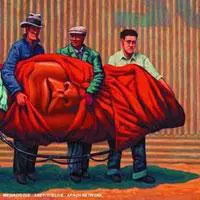I've been harder on the Mars Volta than most. Much of that stems from frontman Cedric Bixler-Zavala's confession that he split up At the Drive-In because he felt "punk" and "hardcore" were too limiting. That kind of thing smacks of condescension to a scene which he both contributed and took from, and as a result, I couldn't help but take things personally. It wasn't until later that I gave De-Loused a fair listen and realized the strength of the songwriting, performances and its own particular charms.
However, the sophomore full-length, Frances the Mute presented its own share of challenges. The album spent too much time indulging composer Omar Rodriguez-Lopez's love of soundscape and collage, resulting in many aimless moments that strained patience rather than pushing boundaries. While it did carry some of the band's finest performances, particularly from the band's consistently incredible vocalist, it often felt like the band had been struggling to fill the CD's 76-minute running time, and for no good reason. While not a failure by any measure, it was a disappointment compared to the finely focused intensity of the debut.
With Amputechture, the band has handily addressed that complaint, producing a solid 76 minutes of actual music, and perhaps their most dynamically diverse performance since De-Loused. The album also sees a reduction in the dependence on concept, with Cedric's lyrics following more of a thematic arc than following a single storyline. The resulting lyrics enabled him to tackle a broader range of topics, though all filtered through the recurring theme of the effects of religion in the world.
"Vicarious Atonement" begins the album slowly, with Bixler-Zavala matching his vocals to Red Hot Chili Pepper John Frusciante's heavily processed guitars. The track maintains a leisurely pace before breaking apart in a brief moment of John Zorn-like horn madness before hitting one of three ten-minute plus tracks. The track delineation is somewhat loose here, even more so than on Frances the Mute where each track is seamlessly blended with the preceding one. With "Teragrammation," Cedric actually takes advantage of his stunning voice, effortlessly hopping through octaves and providing a more than capable foil to both the guitars and horns which accompany him. At more than sixteen minutes, the track is a marvel of cacophonous madness which gradually reveals its own twisted purpose with repeated listens.
The album's first single, "Viscera Eyes" is remarkably accessible even at more than nine minutes. Driven by an aggressive burst of riffing, it acts not just as the most economical song the band has produced, but provides a fine link back to At the Drive-In's later era. "Day of the Baphomets" is similarly driven, with the band's beloved Latin drums bolstered by raucous horns and plenty of aggressive tempos that owe as much to Fugazi as they do to Mr.Bungle's second album.
Amputechture does suffer from one crucial flaw however, and one made ever more acute by the ever increasing scope of the band's output: The band has become far too comfortable with performing "prog rock" as a genre, rather than progressive rock as an ideal. In many ways, the band is falling into the same pits that befell their predecessors; there are dazzling displays of guitar technique, truly warped time signatures and unique sounds throughout, but these rarely do more than serve as interesting little accents. Much of the strength of the album comes from the conventional: melody, rhythm and lyrics. The risk, and this clearly affected Frances, is losing sight of these, as the band does on the album's closing track "El Ciervo Vulnerado," which seems far too fascinated with the sound of the sitar rather than any musical possibilities it might offer.
The greater freedom granted by the band's eschewing of grandiose concepts has resulting in some of the band's most diverse and nuanced performances. Cedric is often the star of the record, with a truly dynamic, multi-faceted vocal performance that often surpasses the veritable orchestra behind him. The greater success has also afforded the band this same stable of musicians who are usually, but not always put to good use. Like the break-up of their previous band forced them to reevaluate their sound and compositions, the Mars Volta needs a similar jolt before their next record, lest they succumb to the pressures of being a better than average example of "prog" rather than truly progressive.
